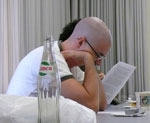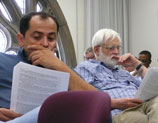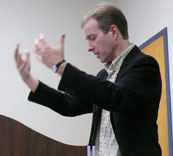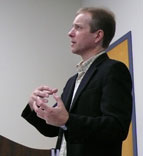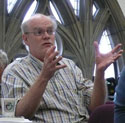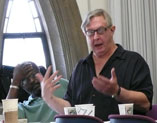

![]()
::: postdoc fellowships
::: senior fellowships
::: resident fellowships
::: associateships
![]()
being here
::: visiting
::: the last donut
::: photo album
::: center home >> being here >> last donut? >> 14 september 2007 |
Friday, 14 September 2007 There is a story philosophers of science love. It is the story of a leading scientist, of Nobel Prize winning stature or better, who prepares for a great discovery by feeding voraciously on philosophy. That love is undiminished even when the story transpired 350 years ago. Before writing his epochal Mathematical Principles of Natural Philosophy, Isaac Newton had grappled with notions of space and matter and much more. His musings are recorded in his hand in the manuscript De Gravitatione et Aequipondio Fluidorum, known with familiar affection to us now as De Grav. It is a work drenched in metaphysics, philosophy and theology, such as would be a stimulating draught for any freshman philosophy student. Ed Slowik, Visiting Fellow and speaker today, has chosen De Grav as his topic. His goal was to distill out part of the essential philosophy and theology that saturates the manuscript. What was Newton's view of space, Ed wants to know. The starting point is well known. Newton famously based his new mechanics on Absolute Space, the independent arena in which all processes play out. Traditional metaphysics has a natural category for such things. They are substances, independent existents; or, to use Ed's informal language, they have "ontological oomph." So, does Newton regard space to be a substance? Ed was not satisfied with the answers he found to this question in the literature. One is in an important analysis by Howard Stein of the University of Chicago. Stein had urged that Newton did not think space a substance after all; space is a necessary consequence that follows merely from the existence of things. That there is stuff, Stein found Newton saying, necessitates the existence of the space that holds it. It is rather like a birthday party. You don't have one until the party-goers are there. They make the party. Ed's second point of dissatisfaction was a claim by my senior colleague and Newton scholar par excellence, Ted McGuire, who had found no serious neo-Platonism in De Grav. They were both wrong, Ed assured us, and he was going to show us how, by citing Newton, chapter and verse.
It reflects directly the sort of scholar Ed is. He is a document guy. He is drawn to the very words that Newton himself so carefully penned 350 years ago as he struggled to clarify his own thoughts. Ed believes that those words deserve our equally careful scrutiny some 350 years later, if we are truly to penetrate Newton's thought. That mode of presentation changes the demeanor of the audience. We do not sit in a semi-darkened room gazing at the light of a screen. We turn our faces away from the speaker and reverently hunch over the text as Ed reads the words aloud. The words gave Ed his case. Against Stein, there was no talk here in De Grav of necessary connection. But there was talk of space "approaching more nearly to the nature of substance." And against McGuire, the text was permeated with familiar neo-Platonic jargon. Most striking was talk of "emanation." As far as my lay grasp of neo-Platonism allows, that doctrine portrays all that exists in our ordinary surroundings as an imperfection somehow emanating from ideal perfections that merge Plato's forms and the god of theology. The illuminating metaphor for this process of emanation is the radiation of light and warmth from the sun. Its blinding heat can only be withstood at a distance, while at the same time it endows our earth with warmth and life.
Ed continued assembling the pieces for us. The picture that emerged, he felt, combined the correct insights of those who wrote before into a better understanding of Newton's De Grav view of space. All things are emanations from god, including that which we classify as substance, and space too is an emanation from god; so neither manifests the traditional hallmark of substance-- independence--in the sense that neither is independent of god. Or at least that is my ten second gloss. The fuller version may be read in Ed's manuscript, which he obligingly posted to philsci-archive.pitt.edu. We took our break and, despite Peter Machamer's efforts, passed easily through an energetic question time. After we closed, I found that, in a moment of start-of-term confusion, I had forgotten to give him his umbrella. The presentation was made a half hour later in a private ceremony in Ed's office. John D. Norton Edward Slowik |

